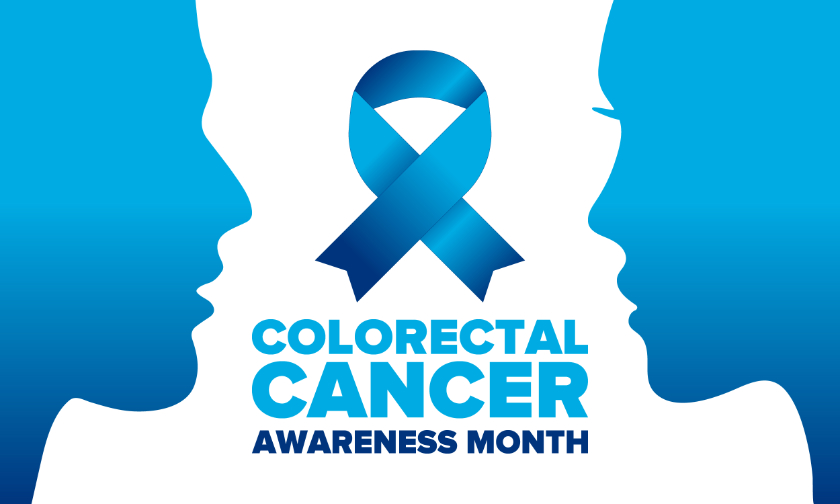

March is National Colorectal Awareness Month

In February of 2020, President Clinton declared March as National Colorectal Cancer Awareness Month. Every year during the month of March, healthcare professionals, organizations, people who have had colorectal cancer and their families participate in events that bring attention to this serious disease.
Colorectal cancer is a disease that affects the colon, or large intestine, and rectum. The colon and rectum form a hollow tube that is the last part of the digestive tract, connecting the small intestine to the anal opening. The colon absorbs water, stores waste, and expels stool.
Cancer is a disease characterized by the spread of abnormal cells that interfere with the way healthy cells function. Cancer is a progressive disease, which means the abnormal cells can spread to other parts of the body to cause problems in organs far from the original site. In colorectal cancer, these abnormal cells first develop in the colon or rectum. In time, the abnormal colorectal cells can spread to nearby tissue, lymph nodes, and tissues far away from the colon and rectum.
Most colorectal cancers start as polyps, which are small growths on the tissue lining the inside of the colon or rectum. Some types of polyps can turn into cancer. Removing pre-cancerous polyps can prevent colorectal cancer from developing.
Not counting skin cancer, colorectal cancer is the third most common type of cancer diagnosed in men and women in the United States, according to the American Cancer Society. Doctors will diagnose 106,180 new cases of colon cancer and 44,850 new cases of rectal cancer in 2022, according to estimates by the American Cancer Society. About 1 in 23 men will develop colorectal cancer at some point in life, as will about 1 in 25 women.
Colorectal cancer will claim approximately 52,580 in 2022. Fortunately, colorectal cancer death rate has been declining for several years. A number of factors are contributing to the lowered death rate, including the detection and removal of polyps, and finding colorectal cancer in its earliest stages, when it is easiest to treat. Treatments for colorectal cancer has improved over the years. As the result of screening, early detection, removal of polyps and better treatments, there are now more than 1.5 million colorectal cancer survivors in the US.
While the death rate in the general public continues to drop, deaths from colorectal cancer are increasing in people younger than 55. In fact, the death rate in these younger patients have increased by 1 percent each year between 2008 and 2017. The organization Fight Colorectal Cancer predicts that colorectal cancer will be the #1 cause of cancer deaths among people 20 to 49 by the year 2030.
Screening for Colorectal Cancer
Screening can prevent colorectal cancer by detecting the disease in its early stages, when it is most curable. There are now a wide variety of screening options available, but depending on the patient’s risk factors, some are better than others.
Colonoscopy remains the “gold standard” of colorectal cancer screening. To perform a colonoscopy, a doctor inserts a thin, flexible tube into the patient’s rectum and guides it all the way to the beginning of the colon. The tube, known as a colonoscope, features a digital camera and a light that allows the doctor to detect any abnormalities. The doctor can also remove any polyps and send the tissue to the lab for testing.
Other colorectal screening methods include FIT and mt-sDNA tests that allow patients to collect their stool at home and send to a lab. While these tests can detect changes associated with colorectal cancer, they do not provide an opportunity to remove suspicious polyps.
How to Participate in National Colorectal Cancer Awareness Month
Advocate Screening
Encourage friends and family members who are 45 years old and older to undergo screening for colorectal cancer.
Find Resources that Help Spread the Word
Organizations, such as the Colorectal Cancer Alliance and the American Society for Gastrointestinal Endoscopy (ASGE), provide a number of resources that help bring awareness to colorectal cancer. The Colorectal Cancer Alliance supports “Dress in Blue Day” on March 4th, for example, and offers a collection of clothing, magnets, headbands and waist packs, tote bags, brochures, light-up message boards and more to help spread awareness of this serious disease. ASGE offers posters, stickers, banners, public services ads and videos that raise awareness of colorectal cancer. Other organizations, such as Fight Colorectal Cancer.
Make an Appointment for a Colonoscopy
While there are other tests to screen for colorectal cancer, colonoscopy is the best choice for screening because it gives doctors a chance to remove suspicious polyps before they become cancerous. Invite friends and family to schedule their colonoscopy on the same day. After the procedure, tell your friends and family how easy colonoscopy is, and how relieved you are to have been screened for colorectal cancer.
For more information about colorectal cancer and National Colorectal Cancer Awareness Month, consult with your doctor or medical imaging professional.





